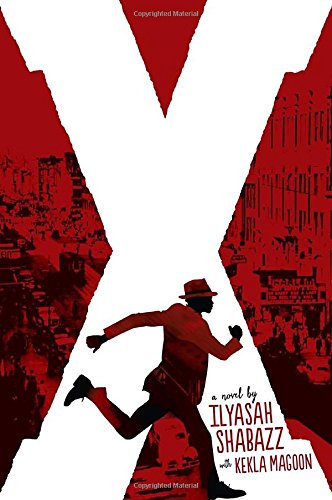That's the basic background of Malcolm Little's youth, although as the timeline in the back of the book explains, prior to his father being murdered, he'd been one to protest unfair discrimination. The family house had been set on fire and burnt to the ground because the Littles dared to live on property that was supposed to be reserved for white people. At the age of fifteen, Malcolm moves to Boston, where he works on the train between Boston. Later he moves to New York, where he's known as "Detroit Red".
Recounted in first person, this novel conveys the essentials of Malcolm X's early life. The earliest part of the book contains a number of jumps in time - always labeled, but not always as easy to follow as it could be, though nearly every single scene in the book is fraught with tension, so it pulls you right through.
Imagine that your father was murdered when you were only two years old. That's precisely what happened to Malcolm X (aka El-Hajj Malik El-Shabazz) in 1965, when his daughter Ilyasah was a toddler. She great up learning about her famous father from family members. She found his notes and letters and pieced together his life, writing this novel with (amazing, award-winning author) Kekla Magoon as a labor of love, a way of conveying what her father's early life was like. Not only is it not all pretty, it's very rarely got anything uplifting or beautiful going on in it.
Malcolm Little was looked down upon for his race, as well as for his father's preachings/teachings and decisions to try to live an egalitarian life in a racially prejudiced world. He was told by many people over the course of his youth that he was "just a nigger", and would never amount to anything. Moreover, as the book makes clear, in his teen years and early adulthood, he made a serious of decisions that compounded things. If there was a bad decision to be made - drinking, substance abuse, theft, and more - he pretty much made it. And this book, living so close inside the head of Malcolm's character, drags you through each and every one. Even though you can understand his anger and pain, feel it along with him, part of you shouts "NO!" pretty much every wrong step he makes.
In prison, he decides to decline his food and ends up in solitary. In solitary, he throws his tray and ends up someplace worse. Eventually, he befriends an older prison named Bembry, a man of calm thoughts and actions, who convinces Malcolm to read the dictionary, and then a book by W.E.B. Dubois.
Reading requires stillness. I've been running so fast, so hard, so long, it actually hurst to stand still. Everything behind me continues to move forward, while I am stuck here. I can't outrun it now. The bars won't let me. I jog in place, lifting my knees in a fierce rhythm that raises my breath and sets my heart pounding, but doesn't quite drum out my rising thoughts.At twenty-three, in another prison, a now-clean Malcolm comes to an essential realization about himself: that when he lost his father, he lost his belief system. He knows that people want to say he's no good, and end his story behind bars, but he decides to reach for something different for himself, and to find a way to move on.
The novel's text is followed by a wonderful Author's Note from Ilyasah Shabazz, notes about some of the characters, a timeline of Malcolm X's life, a family tree, some pages of historical context for the years involved inside the novel's covers and beyond, and lists of recommended further reading.
This novel encapsulates much of 20th-century African-American history, making it an awesome choice for African-American History Month. Besides the facts it contains, the first-person presentation, and the depiction of how racism is ingrained in our social system (still, as one concludes during the reading) is both thought-provoking and profoundly depressing, but in the sort of way that makes one wish to change things, rather than give up.


No comments :
Post a Comment